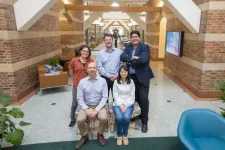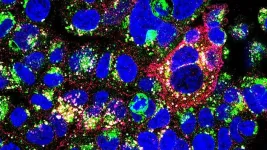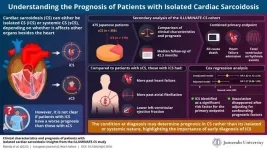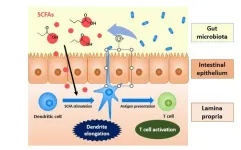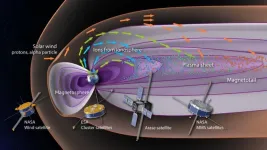(Press-News.org) WASHINGTON – The Society for Neuroscience (SfN) will present five neuroscientists with this year’s Science Education and Outreach Awards, comprising the Award for Education in Neuroscience, the Science Educator Award, and the Next Generation Awards. The awards will be presented during SfN’s annual meeting, Neuroscience 2023.
“The Society is honored to recognize this creative group of neuroscientists working to educate the public about science and combat misinformation,” SfN President Oswald Steward, said. “Their innovative approaches — including games and viral social media videos — inspire not just the next generation of neuroscientists, but also non-scientists around the world, provide hands-on experience to underserved communities, and increase the public’s understanding of neuroscience.”
Award for Education in Neuroscience: Angel Kaur
The Award for Education in Neuroscience recognizes individuals who have made outstanding contributions to neuroscience education and training. The award includes travel to SfN’s annual meeting.
Angel Kaur, an associate professor of neuroscience at the University of North Carolina (UNC), Asheville, has implemented creative strategies to educate both neuroscience students and students outside of the sciences. In addition to designing and teaching many neuroscience courses and laboratory activities, Kaur expanded her reach by creating several interdisciplinary courses including a freshman seminar on science communication and an Arts and Ideas course on neuroscience fiction in film. These courses are well loved and help inspire an interest in neuroscience for students outside of the department. She has also created game-based learning activities for her neuroscience courses, including a neurotransmission board game called Signal, a vocabulary card game series called Forbidden Neurds, and several interactive puzzles. These games have been so successful they have been showcased at conferences, adopted by faculty across the country, and led to many speaking opportunities. Kaur has secured education grants that help expand upon her pedagogy and grow her own educational practice, as well as bring scientific studies into undergraduate classrooms across STEM departments at UNC Asheville. Kaur has also received many honors and awards, including various teaching awards, from UNC Asheville.
Science Educator Award: Christian Bravo-Rivera and Kelly Lambert
The Science Educator Award is supported by the Dana Foundation and honors two neuroscientists who have made significant contributions to educating the public about neuroscience. The award includes a $5,000 prize, travel to SfN’s annual meeting, and an opportunity to write a feature commentary on science education in eNeuro.
Christian Bravo-Rivera, a neuroscientist at the University of Puerto Rico School of Medicine, created NeuroBoricuas, a groundbreaking initiative that is inspiring and nurturing the next generation of neuroscientists in Puerto Rico. NeuroBoricuas promotes neuroscience knowledge in Puerto Rico by developing research labs in high schools, enabling educators to teach neuroscience, and creating collaborations between research institutions and schools. Bravo-Rivera has brought together a group of scientists and educators committed to revolutionizing the scientific culture of Puerto Rico and created a platform for students to engage in hands-on experiments, interactive workshops, and mentorship opportunities. Aspiring neuroscientists also help and encourage each other as well as exchange findings and join in scholarly conversations through NeuroBoricuas. Bravo-Rivera actively seeks to engage students from underrepresented communities, provides them with opportunities that may have otherwise been inaccessible, and prepares them to excel in the diverse and collaborative scientific community. His ability to make complex scientific concepts accessible and engaging is unparalleled and his leadership, creativity, and unwavering commitment to improving science education have had a lasting impact on countless students in the wider community, fostering curiosity and instilling a love of learning.
Kelly Lambert, a behavioral neuroscience professor at the University of Richmond, deftly merges best practices in education with outstanding science that makes neuroscience accessible, interesting, and fun for both her students and the community at large. She has written two textbooks, “Clinical Neuroscience: Psychopathology and the Brain” and “Biological Psychology,” which both have sold thousands of copies, educating students around the world about the wonders and mysteries of the brain. She has also written three mainstream books — “Lifting Depression,” “The Lab Rat Chronicles,” and “Well-Grounded” — and is at work on a fourth. Lambert’s work is often covered in the mainstream news and her rodent driving research and science outreach program has been highlighted in two documentaries, including the Netflix series, “The Hidden Life of Pets,” demonstrating her exceptional ability to present complex concepts to non-scientists in an accessible way. She also engages in public outreach in various ways, from appearing on podcasts to creating a YouTube video series called “Brain Chronicles,” which explains fundamental neuroscience concepts in twenty minutes or less. At Randolph-Macon College, she co-founded the Summer Undergraduate Research Fellowship, which has provided hundreds of college students full-time paid summer research experiences. She is incredibly caring, creates an inclusive and nurturing environment particularly appreciated by students from traditionally marginalized communities in STEM, and continues mentoring her students throughout their career, establishing lasting relationships. Lambert is an innovative
teacher who provides excellent training in the classroom and beyond, has been honored for her undergraduate teaching and mentorship, and has inspired a multitude of students from all backgrounds to pursue careers in neuroscience due to her passion for teaching.
Next Generation Award
The Next Generation Award recognizes SfN chapter members who have made outstanding contributions to public communication, outreach, and education about neuroscience through activities such as classroom engagement and social media campaigns, typically at the high school level or below. The award includes a $300 honorarium and a $750 travel award, plus a $2,000 chapter grant to be used to continue the chapter’s outreach efforts in the following year.
Pre/Postdoctoral: Erin Purvis and Benjamin Rein
Erin M. Purvis, a neuroscience doctoral candidate at the University of Pennsylvania, is passionate about connecting biomedical researchers and trainees with the community and has engaged with students at all levels — from elementary to graduate school — with a focus on underserved groups. She co-created an academic program in community engagement at the University of Pennsylvania that includes both a graduate-level course and a certificate program. The course allows biomedical graduate students to develop their science communication skills by preparing demonstrations and hands-on activities for local high school students in West Philadelphia. The course also includes discussions of the challenges local schools face and proposals to address them, as well as reflections on the connection between students' biomedical research and the local community, the historical role of science in underrepresented communities, and opportunities to increase science-oriented engagement throughout doctoral training. The certificate program is the first formalized academic program in community-engaged scholarship to be offered for biomedical trainees at the University of Pennsylvania. She also helped launch a partnership providing a dozen undergraduate students from Historically Black Colleges and Universities with a summer internship that challenged each of them to hone skills in science communication and design their own project proposals. Purvis’s efforts to establish a sustainable connection between biomedical students at the University of Pennsylvania and the community of West Philadelphia will have a lasting effect of community engagement and inspire generations of future neuroscientists, both those at Penn and in the local community.
Benjamin Rein, a postdoctoral researcher at Stanford University, creates educational videos viewed by millions on social media apps such as TikTok and Instagram. He started posting videos to combat misinformation at the start of the pandemic, quickly gained views and followers, and realized the immense potential to educate and break down barriers between
science and society. His videos cover a variety of topics in neuroscience and related areas, such as summarizing research articles, debunking misinformation in viral videos, teaching basic neuroscience principles, and providing guidance for students pursuing careers in science. He now has over 700,000 followers on TikTok and over 115,000 followers on Instagram. His TikTok videos have over 50 million views and have been featured on Good Morning America, the New York Post, and ABC News, and Rein has appeared on Entertainment Tonight, written for multiple magazines, participated in over 30 podcasts, provided consultation for documentaries, and given a variety of talks. He also spearheaded writing a letter backed by scientists, physicians, and educators to the podcasting app Spotify requesting that the platform implement a misinformation policy in light of COVID misinformation being spread through its podcasts. As a result, Spotify changed its policy. Rein also helps other scientists improve their public communication skills through an interactive workshop he created and he provides career advice and free resources for students on his website (such as curriculum vitae templates and a sample PhD interview schedule). His exceptional skills at communicating science in an accessible and interesting way have allowed him to have a broad reach and help combat misinformation and increase scientific understanding and public trust of science.
###
The Society for Neuroscience (SfN) is an organization of nearly 35,000 basic scientists and clinicians who study the brain and the nervous system.
END
Society for Neuroscience 2023 Education and Outreach Awards
2023-10-30
ELSE PRESS RELEASES FROM THIS DATE:
A sustainable alternative to air conditioning
2023-10-30
As the planet gets hotter, the need for cool living environments is becoming more urgent. But air conditioning is a major contributor to global warming since units use potent greenhouse gases and lots of energy.
Now, researchers from McGill University, UCLA and Princeton have found in a new study an inexpensive, sustainable alternative to mechanical cooling with refrigerants in hot and arid climates, and a way to mitigate dangerous heat waves during electricity blackouts.
The researchers set out to answer how to achieve a new benchmark in passive cooling inside naturally conditioned buildings in hot climates such as Southern California. They examined the use of roof materials ...
Microdroplets, macro results: Beckman researchers pursue Energy Earthshots
2023-10-30
Good things come in microscopic packages, according to the Beckman Institute for Advanced Science and Technology’s new DROPLETS project.
By packaging electrochemical reactions in smaller-than-standard serving sizes, interdisciplinary researchers aim to produce clean hydrogen, sequester carbon dioxide, and store renewable energies like wind and solar inexpensively and sustainably. Their project, called DROPLETS, received $4.5 million from the U.S. Department of Energy’s Office of Science through its Energy Earthshots Initiative.
“If we do this right, we will ...
Landmark menopause toolkit updated to improve assessment and treatment
2023-10-30
Care for women with menopausal health issues should improve globally following the release of an updated Monash University-led toolkit that guides health professionals around the world in assessing and treating them.
Endorsed by the International, Australasian and British Menopause Societies, the Endocrine Society of Australia and Jean Hailes for Women’s Health, the 2023 Practitioner’s Toolkit for Managing the Menopause is designed to be used anywhere in the world.
Published in Climacteric, the Toolkit has been updated and enhanced from the original 2014 Toolkit for practitioners with new advice and therapies based on a systematic review of the latest menopause ...
New antibody could target breast cancers
2023-10-30
An enzyme that may help some breast cancers spread can be stopped with an antibody created in the lab of Cold Spring Harbor Laboratory Professor Nicholas Tonks. With further development, the antibody might offer an effective drug treatment for those same breast cancers.
The new antibody targets an enzyme called PTPRD that is overabundant in some breast cancers. PTPRD belongs to a family of molecules known as protein tyrosine phosphatases (PTPs), which help regulate many cellular processes. They do this by working in concert with enzymes called kinases to control how other proteins ...
Drawing a tube of blood could assess ALS risk from environmental toxin exposure
2023-10-30
Over the last decade, research at Michigan Medicine has shown how exposure to toxins in the environment, such as pesticides and carcinogenic PCBs, affect the risk of developing and dying from amyotrophic lateral sclerosis.
Now, investigators have developed an environmental risk score that assesses a person’s risk for developing ALS, as well as for survival after diagnosis, using a blood sample.
The results are published in the Journal of Neurology, Neurosurgery and Psychiatry.
“For the first time, we have a means collecting ...
Research grants available: $50,000 to evaluate race in risk calculators
2023-10-30
DALLAS, October 30, 2023 — Multiple 1-year grants of up to $50,000 each are available from the American Heart Association to fund research that evaluates the use of race in heart disease and stroke risk calculators.
The American Heart Association, the single largest non-government supporter of heart and brain health research in the U.S., is offering the funding as part of the De-Biasing Clinical Care Algorithms project. The project is a two-year scientific research strategy, supported in part by a grant from the Doris Duke Foundation, to study the complex issue of how race and ethnicity factor into clinical care ...
Shedding light on the paradoxical prognosis for patients with cardiac sarcoidosis, a rare and difficult-to-diagnose inflammatory heart condition
2023-10-30
Sarcoidosis is a complex inflammatory disease that causes the harmful accumulation of tiny clumps of cells called granulomas in the body. In most cases, sarcoidosis manifests in the lungs and lymph nodes. However, in approximately 10% of patients, the heart is affected; this condition is known as ‘cardiac sarcoidosis (CS).’ Although relatively rare, CS can cause life-threatening complications, including arrhythmia, heart failure, or sudden cardiac death.
One puzzling aspect of CS is that the condition sometimes involves the heart alone, without manifesting clinically apparent symptoms in other organs. This is referred to as isolated ...
Intestinal bacteria metabolite promotes capture of antigens by dendritic cells
2023-10-30
Dendritic cells play a key role in the mammalian immune system. These cells are present throughout the human body and are known to capture foreign bodies, i.e., antigens, using extendable “arms” called dendrites. Once captured, dendritic cells present these substances to immune T cells, thereby initiating an immune response. Dendritic cells are responsive to their environment and capable of changing their morphology and other attributes dynamically. For instance, dendritic cells in the intestine’s mucosa (inner layer) capture harmful bacteria by extending their dendrites through the epithelium (outermost layer) ...
Virtual meetings tire people because we're doing them wrong
2023-10-30
New research suggests sleepiness during virtual meetings is caused by mental underload and boredom. Earlier studies suggested that fatigue from virtual meetings stems from mental overload, but new research from Aalto University shows that sleepiness during virtual meetings might actually be a result of mental underload and boredom.
‘I expected to find that people get stressed in remote meetings. But the result was the opposite – especially those who were not engaged in their work quickly became ...
The importance of the Earth’s atmosphere in creating the large storms that affect satellite communications
2023-10-30
A study from an international team led by researchers from Nagoya University in Japan and the University of New Hampshire in the United States has revealed the importance of the Earth’s upper atmosphere in determining how large geomagnetic storms develop. Their findings reveal the previously underestimated importance of the Earth’s atmosphere. Understanding the factors that cause geomagnetic storms is important because they can have a direct impact on the Earth’s magnetic field such ...
